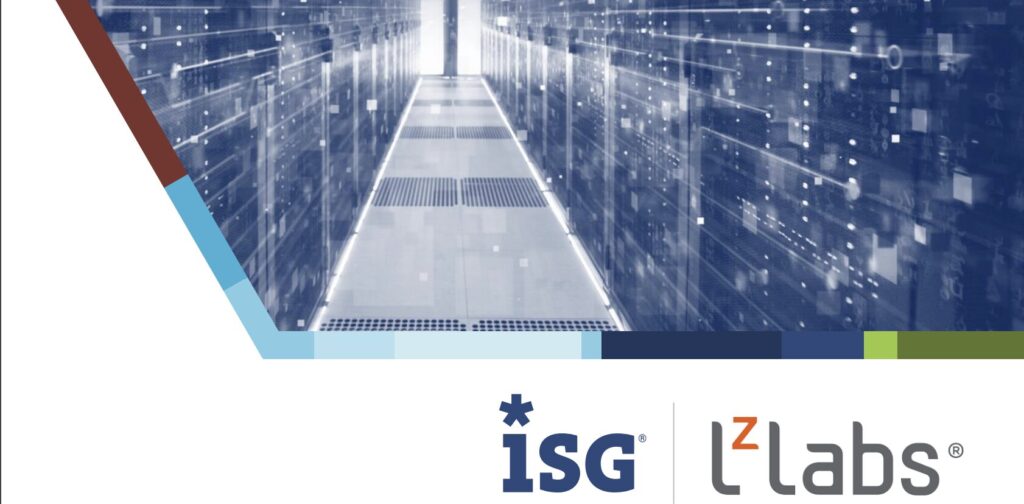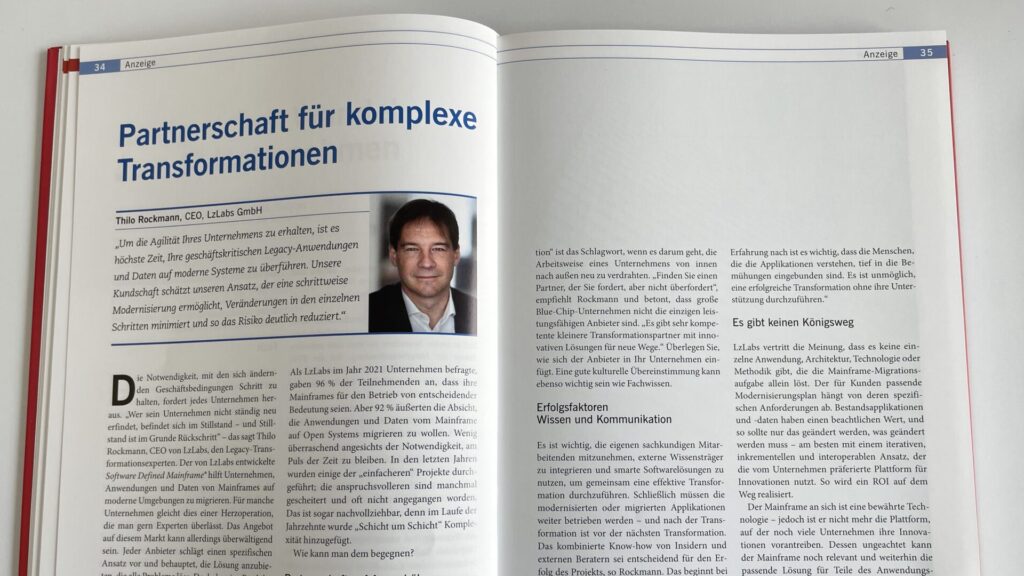LzLabs featured in Sunday Times “CIO 2025” Report

The full report from Raconteur is also available to be read at your convenience.
“Risk of Doing Nothing”: 95% of IT Leaders Concerned About Mainframe Modernization Backlog – ISG Survey Reveals

Zurich, 16 April 2024 – 95 percent of IT leaders across industries have voiced concerns over the implications of not modernising applications and data running on mainframe systems. Experts predict that business agility, customer experience, and technology compatibility will suffer from a mounting modernisation backlog. These are findings of an in-depth research study conducted by the […]
„Das Risiko, nichts zu tun”: 95 % der IT-Führungskräfte besorgt über Modernisierungsstau bei Mainframe-Systemen – ISG-Umfrage veröffentlicht

Zürich, 16. April 2024 – 95 Prozent der IT-Führungskräfte sind darüber besorgt, dass Anwendungen und Daten, die auf Mainframe-Systemen laufen, nicht modernisiert werden. Experten rechnen branchenübergreifend damit, dass die Wettbewerbsfähigkeit mit Blick auf Kundenzufriedenheit, Agilität und Anpassung an neue Technologien immer stärker unter dem Modernisierungsstau leiden werden. Dies sind Ergebnisse einer aktuellen Studie, die im […]
“Le risque de ne rien faire” : 95% des responsables informatiques s’inquiètent du retard pris dans la modernisation des mainframes – selon une enquête de l’ISG

Zurich, le 16 avril 2024 – 95 % des responsables informatiques de tous les secteurs d’activité ont exprimé leurs inquiétudes quant aux conséquences de la non-modernisation des applications et des données fonctionnant sur des systèmes mainframe. Les experts prévoient que l’agilité de l’entreprise, l’expérience client et la compatibilité technologique souffriront d’un retard de modernisation de […]
Amazon Web Services (AWS) Certifies LzLabs Software Defined Mainframe®

Wallisellen, 09 January 2024 – LzLabs today announced that it has successfully completed the Amazon Web Services (AWS) Foundational Technical Review (FTR), a significant milestone that recognises LzLabs Software Defined Mainframe® as an AWS Qualified Software. This accomplishment underscores LzLabs’ commitment to providing secure, efficient, and innovative solutions for customer mainframe application and data integration, […]
Amazon Web Services (AWS) zertifiziert den LzLabs Software Defined Mainframe®

Wallisellen, 09. Januar 2024 – LzLabs gibt heute bekannt, dass das Unternehmen den Amazon Web Services (AWS) Foundational Technical Review (FTR) erfolgreich abgeschlossen hat. Dies ist ein wichtiger Meilenstein, der den LzLabs Software Defined Mainframe® als AWS Qualified Software auszeichnet. Dieser Erfolg unterstreicht das Engagement von LzLabs, sichere, effiziente und innovative Lösungen für die Integration, […]
Amazon Web Services (AWS) certifie le LzLabs Software Defined Mainframe®

Le 9 janvier à Wallisellen – L’entreprise LzLabs annonce aujourd’hui qu’elle a passé avec succès l’examen technique fondamental (FTR) d’Amazon Web Services (AWS), une étape importante qui reconnaît le Software Defined Mainframe® de LzLabs comme un logiciel qualifié AWS. Cet aboutissement souligne l’engagement de LzLabs à fournir des solutions sécurisées, efficaces et innovantes pour l’intégration, […]
Partnering for Complex Transformation

Adapting to evolving business conditions is challenging. “Continual reinvention is essential to avoid stagnation, which equates to regression,” advises Thilo Rockmann, CEO of LzLabs, the legacy transformation experts. LzLabs’ software facilitates the migration of applications and data from mainframes to current systems. Such intricate transformations often necessitate external expertise. The market offers an array of […]
Partnerschaft für komplexe Transformationen

Dieser Artikel erschien im „CIO Jahrbuch 2024 – Prognosen zur Zukunft der IT“ Thilo Rockmann, CEO von LzLabs, betont die Bedeutung von Partnerschaften und Kommunikation in diesem Prozess. Erfahren Sie zudem, warum es keinen universellen Weg der Legacy-Transformation gibt und wie eine individuelle Lösungen aussehen sollte, die den Wert Ihrer Bestandsapplikationen erhält und Ihr Unternehmen […]
LzLabs featured in Sunday Times “Cloud for Business” report – Summer 2023

The full report from Raconteur is also available to be read at your convenience.
On the road again! Meeting clients to help them unleash the potential of their legacy applications.

Together, we will exchange ideas about application modernisation from a holistic perspective. Because organisations that want to reduce their dependency on the mainframe look for solutions, not just software or consultancy. They look for end-to-end guidance and advice along the transformation journey. We will be joined by fascinating speakers who will share with us their […]
Funkschau: Mainframe Modernisation

Funkschau: “Let’s take a look at the practice – what can you report here?” Thilo Rockmann, LzLabs: “LzLabs helped the Italian bank BPER to reduce its dependency on the mainframe. Here, LzLabs Software Defined Mainframe® (SDM) is utilised in two different ways. On the one hand, applications are migrated to SDM and, on the other […]